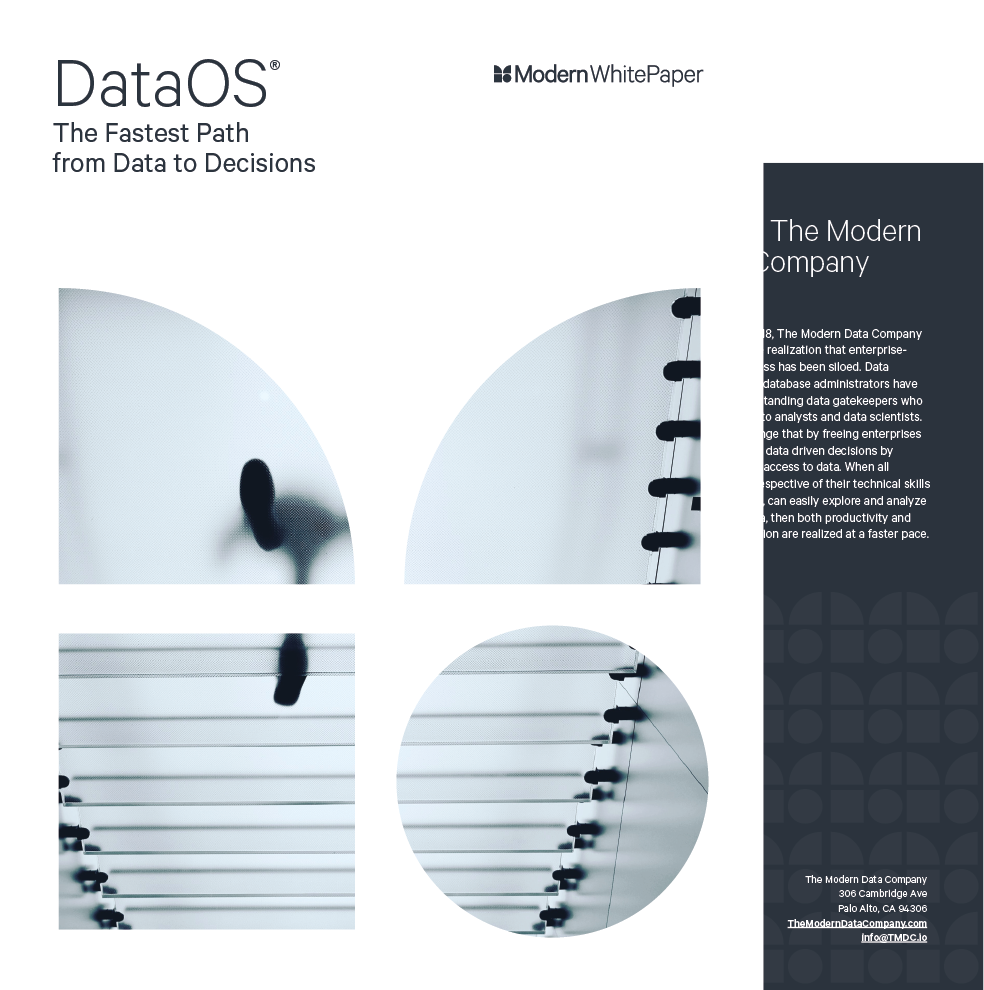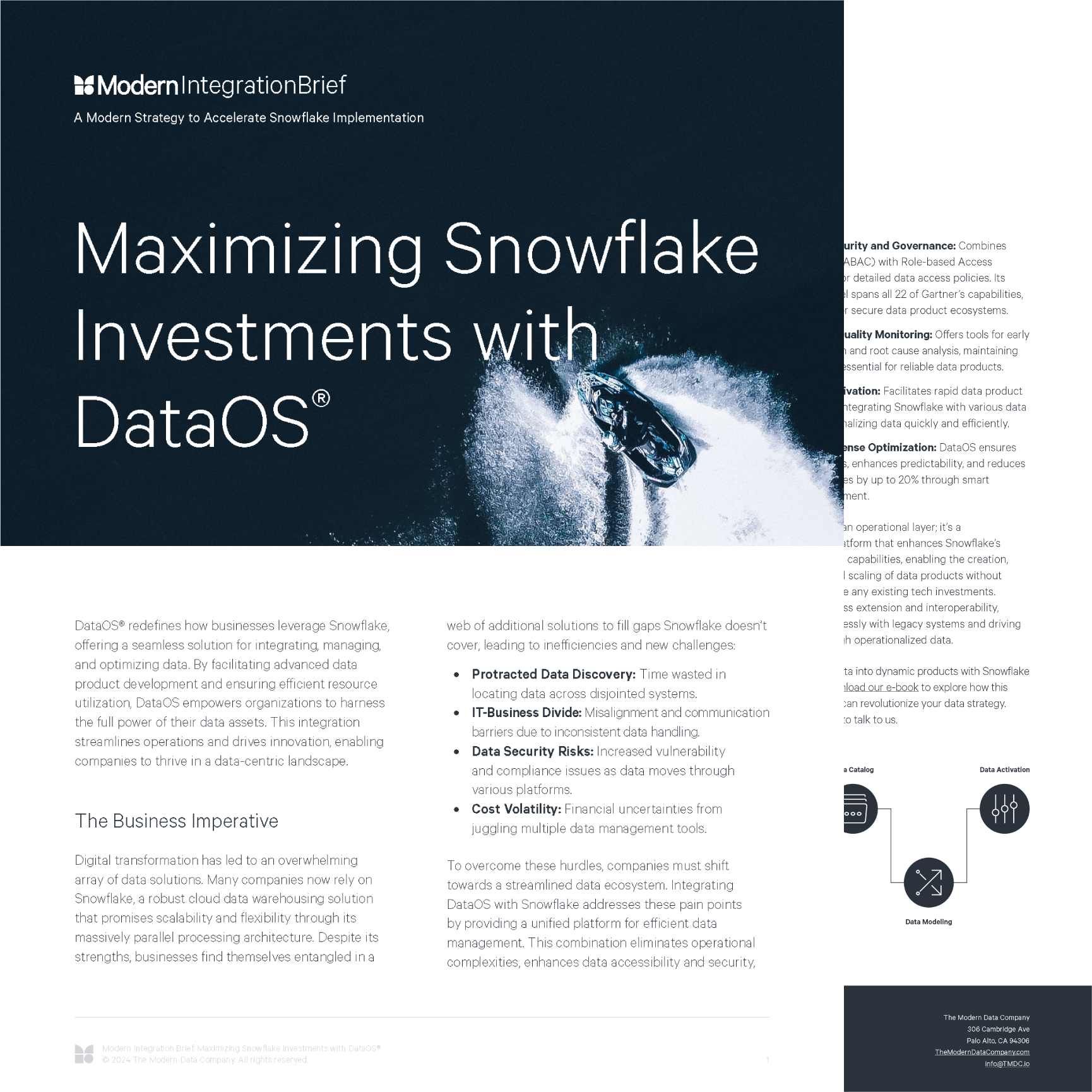
How to drive trusted decisions without changing your current data infrastructure.
Learn more about DataOS® in our white paper.
Data integrity remains a critical concern for healthcare providers as they grapple with digital transformation. Consumers want their digital records available to those who care for them, without compromising security. Big data is a significant component of those records today, and healthcare providers must ensure that data integrity remains a top priority to ensure patient safety.
Healthcare has focused a great deal of its resources on security, but that doesn’t mean the same thing as data integrity. Data security prevents unauthorized access to those records but ensures that healthcare providers and administrators with the right permissions can easily connect to a patient’s data.
On the other hand, data integrity means that data remains consistent, reliable, and accurate over the lifecycle of the data. The lifecycle of any given piece of data depends on its usage, but overall, it ensures that those who rely on the data to make decisions receive quality data.
Integrity and security are interrelated. Breaches in security can impact data integrity. An unauthorized intruder could change relevant information or corrupt records, making them unreliable and dangerous for decision making.
If healthcare providers can’t count on the accuracy and reliability of patient data, everything is lost. They could miss opportunities for diagnosis, risk-averse reactions, or make bad decisions based on faulty data. These mistakes not only threaten patients but also strain operational resources and add unnecessary costs.
Healthcare facilities must ensure the integrity of their data for regular use. Security is the first step, but the continued practice of ensuring the trustworthiness of the data in their care is an ongoing effort. This starts from the first encounter, whether at admission or the first visit, to the end of the patient’s care.
These standards also encourage healthcare organizations to take a proactive approach to both integrity and security rather than relying solely on reactive procedures.
Healthcare facilities must follow a handful of best practices for ensuring quality data.
With the advent of electronic records, it’s more important than ever to demonstrate who observed and recorded the patient’s data. Records must also show when interactions happened, from the first to the latest. This creates a trail of responsibility for patient care.
Preserving patient records includes making them transparent. Simply having access to data isn’t enough; instead, healthcare facilities must maintain complete records with easy-to-understand attribution and documentation of what each data element represents and how it should (and should not) be used.
All records must be in compliance to regulations such as HIPAA and maintain updated cybersecurity. Security breaches can devastate healthcare facilities financially. Implementing governance that specifically targets healthcare-specific data regulations prevents massive consequences such as fines and lost patient trust. The data must also meet any legal standards of accuracy and completeness.
The whole point of having digital transformation within healthcare is to have patient records available when needed. This means putting data in motion so that healthcare providers and patients have access to the latest data at a moment’s notice.
This final piece ensures the accuracy of data while it’s in motion. All data tools should support data accuracy regardless of the process or pipeline. Managing multiple data sources across both legacy and new systems will require a modernized data system and updated policies.
Studies show (see “The Future of Care is Telehealth” or Kapersky’s Healthcare Report 2021) that a majority of patients believe that data integrity and data security are essential parts of digital transformation in healthcare — this is an obvious conclusion. While it’s not at all surprising, it does remind healthcare providers that surviving in a new age of digital care and changing technology will require updated systems and data management approaches.
A data operating system offers healthcare facilities and providers a unique opportunity. Healthcare providers must reduce complexity in their data systems and ensure availability while maintaining strict governance—a tall order at scale. The Modern Data Company’s DataOS offers an end-to-end solution for managing data complexity. It future-proofs data solutions to ensure that healthcare companies can build and deploy needed services at scale.
It’s time to discover what true digital transformation can look like, specifically in healthcare. DataOS can help healthcare companies construct a data fabric or manage governance at the granular level.
Learn more about the benefits of using a data operating system to adopt data fabric for healthcare organizations with our infographic “How Data Fabrics Breathe Life Into Healthcare.”
Be the first to know about the latest insights from Modern.

The elegance of Data Products is undeniable, but many leaders question the efficacy of their data strategies: Why does the return on data investments often disappoint? Why is proving data's value becoming harder? Why do data models become more cumbersome than...

Data is vital to business but the process of getting from data to insights is often murky. Many on the business side may not even care how it happens but understanding this process matters. It matters a lot. With this in mind, let's explore how to demystify the...

We don't want to restrict the scope of this article to only data leaders and influential executives. As startup folks, we are confident in how individual contributors or ICs, such as Data Engineers, DevOps experts, or even the surprising intern, could influence the...

It's a tale as old as time. A startup manages to disrupt an entire industry only to find itself at a critical juncture a few years down the road. Data, the lifeblood of its operations, was becoming increasingly complex and unwieldy. With each new product launch and...

For today's Chief Data Officers (CDOs) and data teams, the struggle is real. We're drowning in data yet thirsting for actionable insights. Traditional data architectures, with their centralized data lakes and batch-oriented processing, are like bloated, slow-moving...

DataOS Sales Accelerator for Food & Beverage The dynamic food & beverage industry demands a data-driven approach to success. The Modern Data Company's DataOS® Sales Accelerator acts as your all-in-one data concierge. Our pre-built solutions, designed...

Unleashing the Power of AI with Data Products Traditional project-centric data management stifles AI innovation with siloed data, slow workflows, and limited reusability. Enter the era of data products: self-contained modules of data, logic, and infrastructure that...

A Pan-Industry Revolution with DataOS® Unleash the revolution with Data Products powered by DataOS®. These self-contained data units, bursting with actionable insights, offer unmatched flexibility, agility, and compliance across all sectors. From personalized customer...

Cross-Sell Accelerator for Credit Cards In the hyper-competitive BFSI landscape, maximize credit card cross-sell potential with data-driven precision. Cross-Sell Accelerator empowers you to forge deeper customer connections with personalized offers, optimize...

Maximizing Snowflake Investments with DataOSUnleash the true potential of your Snowflake investment with DataOS®, the data product platform that seamlessly integrates, empowers, and elevates your existing infrastructure. Build robust data products faster, eliminate...